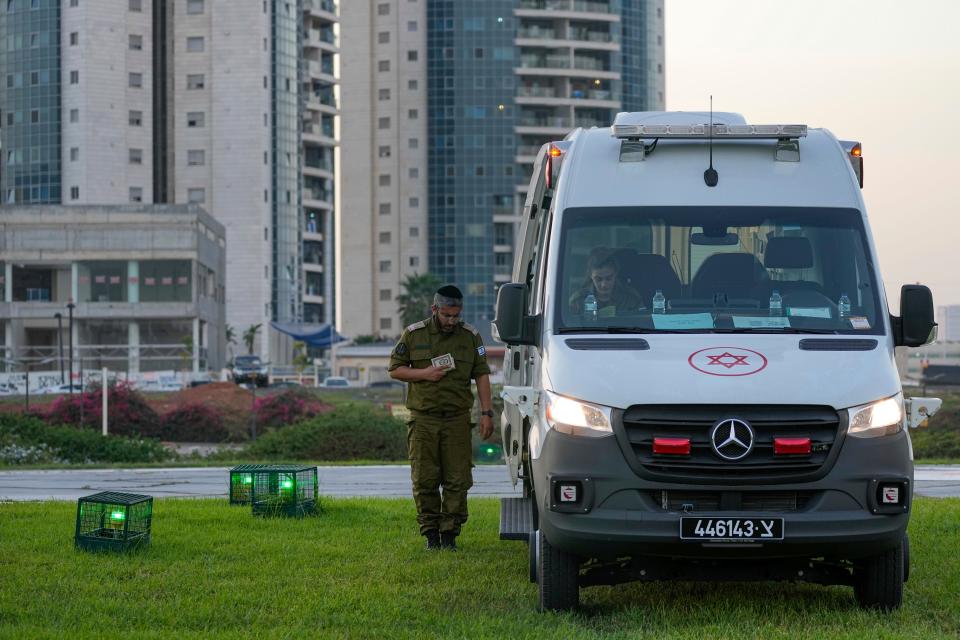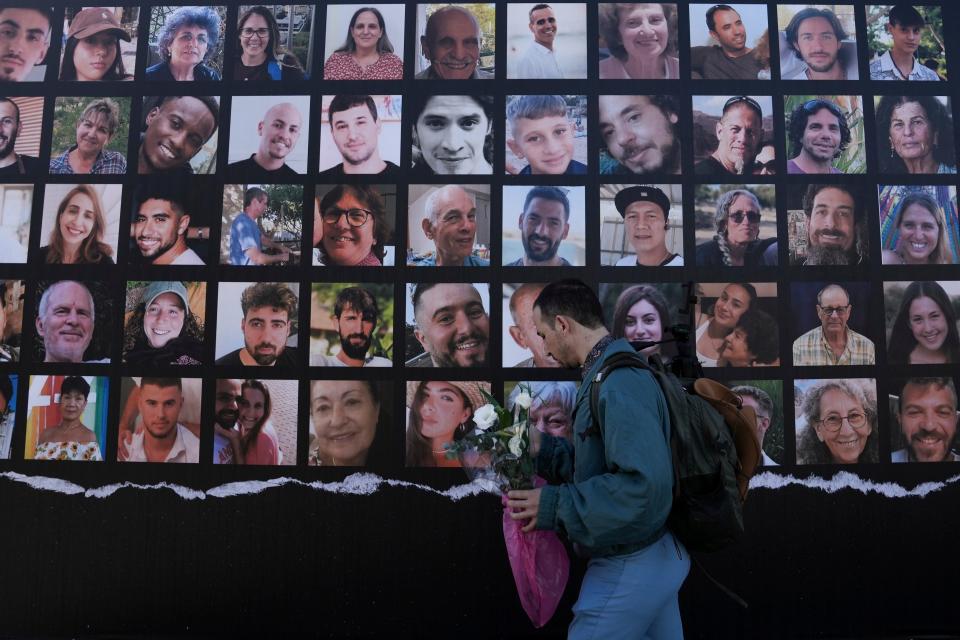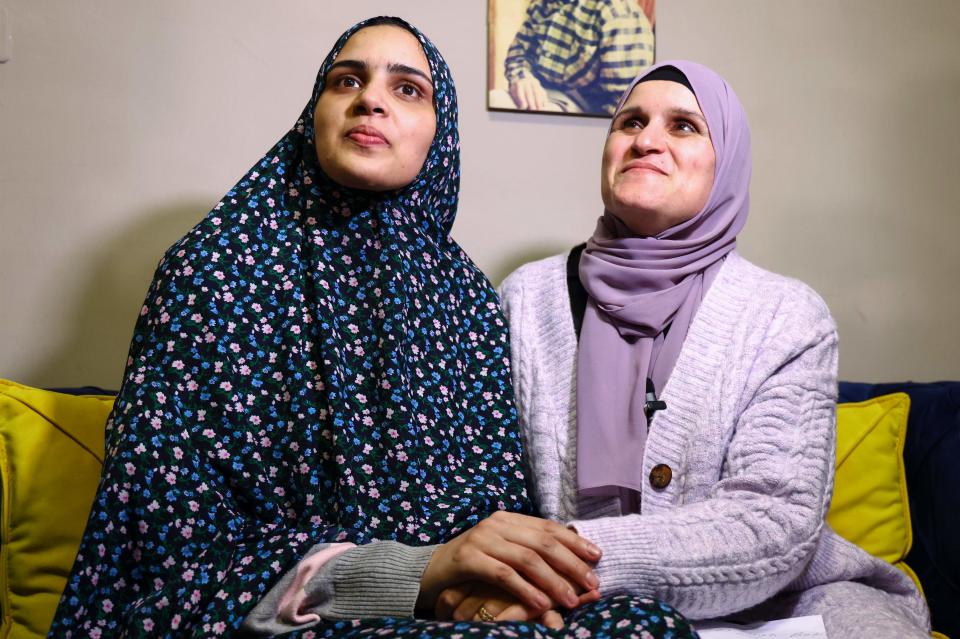Israel-Hamas temporary truce day 1 recap: More hostages to be freed
Editor's Note: For the latest news on the Israel-Hamas conflict, please see our live updates file here.
Hamas was preparing to release 14 Israeli hostages Saturday for 42 Palestinian prisoners held by Israel, according to Egyptian officials, in an exchange that comes on the second day of a cease-fire that has allowed critical humanitarian aid into the Gaza Strip and given civilians their first respite after seven weeks of war.
On the first day of the four-day cease-fire, Hamas released 24 of the about 240 hostages taken during its Oct. 7 attack on Israel that triggered the war. The exchange also resulted in the release of 39 Palestinian women and children who were held in Israeli jails.
"It’s only a start," Biden said in an address from Nantucket on Friday afternoon. "But so far it’s gone well."
He said the agreement was the result of "a lot of hard work," including diplomatic efforts by the United States, Qatar and Egypt. The four-day pause in fighting started at 7 a.m. local time, midnight EST. The deal calls for the release of a total of 50 hostages taken by Hamas and 150 Palestinians held in Israeli prisons.
Both sides agreed to release women and children. Israel also agreed to extend the pause in fighting by one day for every 10 additional hostages Hamas releases.
"We expect more hostages to be released tomorrow" and the days following, Biden said. He said it wasn't clear when some of the Americans still in Hamas captivity would be released, but he expects it to happen.
The hostages released Friday included some 13 Israelis, 10 Thai nationals and one Filipino citizen, according to Majed al-Ansari, a spokesman for the Foreign Ministry of Qatar, one of the countries that served as a mediator in the agreement. The Israelis included children and women, including several elderly women. They underwent an initial medical assessment in Israeli territory and will be transported to Israeli hospitals, according to Israel's military.
The Schneider Children’s Medical Center said it was treating eight Israelis — four children and four women — and all appeared to be in good physical condition. The center said they were also receiving psychological treatment, adding that “these are sensitive moments” for the families.
The Palestinian prisoners released were 24 women, including some convicted of attempted murder for attacks on Israeli forces, and 15 teenagers jailed for offenses like throwing stones.
The cease-fire comes more than six weeks after an estimated 240 people were captured and held hostage by Hamas after its deadly Oct. 7 attack on Israel. The temporary pause in fighting had been scheduled to begin Thursday but was delayed by what al-Ansari said were logistical issues, including verification of the hostage release list exchanged by Israel and Hamas officials.
On the first day of the truce, over 200 trucks of desperately needed supplies, including fuel, were delivered to Gaza. A respite from weeks of attacks was felt in the territory, and rocket fire from Hamas into Israel went silent as well.
Latest developments:
◾ Two Palestinians were killed Friday and 11 others were wounded as Israeli forces fired at people attempting to return to northern Gaza near a main combat zone despite Israel's warnings to stay put, the Associated Press reported.
◾ No U.S. citizens were in the first group of hostages released by Hamas on Friday, and Biden said he is not sure when they will, but remains hopeful Americans will be among the first 50 hostages released over four days. "We don’t know when that will occur, but expect it to occur," Biden said.
◾ Israel Prime Minister Benjamin Netanyahu’s office said it has received a new list of hostages to be released by Hamas on Saturday. After Israel approves the names, a list of Palestinians in prison expected for release Saturday will be sent to Hamas, Haaretz reported.

Hostages to be freed: Inside the 'excruciating' work of a secret US cell that secured the release of 50 hostages
Don't return to north Gaza, Israel warns amid halt in fighting
Israel's military warned people not to return to their homes in the northern parts of Gaza as the temporary cease-fire got underway Friday.
"The war is not over yet. The humanitarian pause is temporary. The northern Gaza Strip is a dangerous war zone and it is forbidden to move north," said Lt. Col. Avichay Adraee, an Arabic language spokesman for Israel's Defense Forces.
In the days leading up to the pause, Israel's government has repeatedly said it sees the halt in fighting as a limited measure only to allow for the freeing of hostages. It has rejected calls for a comprehensive cease-fire.
About 1.7 million people, three-quarters of Gaza's population, have been displaced since Oct. 7.
Father of American hostage does not expect son to be released
As dozens of families await word on whether their loved ones will be released in the hostage and prisoner exchange between Israel and Hamas, American Jonathan Dekel-Chen, 60, is keeping his expectations low.
"It will not involve my son. I am as certain of that as one can be," he said in a brief phone interview.
Dekel-Chen's son, Sagui, 35, hasn't been heard from since Hamas invaded his home on Nir Oz kibbutz, in southern Israel, on Oct. 7. He lived there with his two daughters, ages 2 and 6, and his pregnant wife. They escaped.
Of the 50 hostages due to be released over four days beginning Friday, most if not all are expected to be women and children, according to Israel and Qatari officials.
"I will be overjoyed for those families who can be reunited with their loved ones," Dekel-Chen said.
He described his son, an entrepreneur whose "moonlighting gig is repurposing old buses for new uses," as "the son anyone would love to have. You can't meet him and not smile. He's endlessly positive. He's a builder. He's a creator. He's been that his entire life."

Palestinians waiting to hear news about their children
Palestinian teenager Samed Khaled Abu Khalaf, 17, could be one of several dozen Palestinians, mostly women and children, who could be released from an Israeli prison today, according to his family.
His father, Khaled, 51, said in a brief WhatsApp message Friday that his son was detained by Israel seven months ago. He said he doesn't know why his son was imprisoned.
"Today, God willing," he said.
The teenager's name appears on a list, reviewed by USA TODAY, of 300 Palestinians that Israel's justice ministry said are eligible to form part of a hostage and prisoner exchange between Israel and Hamas. Information under his name says he was arrested in April for "damage to the security of the area."
The family lives in a village in the eastern part of the West Bank.
Palestinian prisoners’ rights group Addameer says that Israel has about 200 boys, most of them teenagers, in detention, as well as several teenage girls. International and Palestinian human rights organizations have long alleged that Israel mistreats its child detainees, whom it prosecutes in military courts and holds for indefinite periods of time. Israel says they are detained for suspected terror-related offenses.
Khaled Mahmoud Abu Khalaf says he is waiting to get a call from the International Committee of the Red Cross to hear whether his son will be freed. The group is helping to facilitate releases on both sides.

United Nations chief describes worsening conditions in Gaza
A United Nations agency head described deteriorating conditions in Gaza on Friday following his second visit to the strip since the war began.
“People are going to sleep holding their children tight while not knowing if they will wake up alive the following morning,” said Philippe Lazzarini, commissioner-general of the United Nations Relief and Works Agency for Palestine Refugees in the Near East, or UNRWA.
People were struggling to have one meal a day and many have not changed their clothes for more than a month, Lazzarini said. Skin diseases and diarrhea have increased exponentially, a consequence of unsanitary conditions worsened by rain. Most of the shops and pharmacies were closed, and some of the streets were eerily empty. Lazzarini said the strikes were constant, and at some points, whole buildings shook.
A vocational training center, once the organization’s “pride and joy,” now resembled an overcrowded prison as 35,000 people took shelter, Lazzarini said. He noted 69 UNRWA shelters have been hit since the war began, some more than once and some directly. Half of them were not in the north.
Lazzarini called for a longstanding humanitarian cease-fire, reopening of commercial supply lines to revive the private sector and replenish empty markets, and expansion of humanitarian aid. He also warned against deepening polarizations the longer the war continued, and slimmer chances of a “political solution.”
How tiny Qatar became a big player in the hostage release
Qatar, a tiny Persian Gulf nation with an abundance of natural gas reserves and a desire for prestige on the world stage, has become a pivotal player in the fate of hostages held by Hamas.
Qatar has taken on the role of intermediary in negotiations aiming to secure the release of more than 200 hostages captured by Hamas in its attack on Israel on Oct. 7.
Qatari mediators also helped broker a deal that has allowed for limited evacuations of foreign passport holders and some critically injured people from the Gaza Strip, which Israel has been pummeling with air strikes since the Hamas attack.
It’s not the first time Qatar has played the role of international mediator.
Qatar helped negotiate the release earlier this year of four Ukrainian children held by Russia, which allowed them to return to their families. A close ally of the U.S., Qatar helped secure the release in 2014 of an American journalist, Peter Theo Curt, who had been held in Syria for two years.
More recently, Qatar played a key role in an agreement between the U.S. and Iran that led to the release in September of five Americans imprisoned in Iran. Iran had accused the Americans of being spies or working on behalf of the U.S. government.
Who are the Israeli hostages and Palestinian prisoners awaiting release?
Three Americans were among the hostages set for release including 3-year-old Avigail Edan, whose parents were killed during the Oct. 7 Hamas attack on Israel, as well as two women, according to a senior Biden administration official.
Israel Prime Minister Benjamin Netanyahu said the deal also included a provision for the International Committee of the Red Cross to visit the hostages in captivity.
Israel’s Justice Ministry published a list of 300 Palestinians eligible for release from prison, mainly teenagers arrested over the past year for relatively minor offenses such as throwing rocks. The youngest detainee on the list is 14. The list also includes about 40 women. The detainees are to be released to their homes in the West Bank, east Jerusalem and Gaza.
Contributing: Maureen Groppe, USA TODAY; The Associated Press
This article originally appeared on USA TODAY: Israel-Hamas temporary truce day 1 recap: More hostages to be freed

